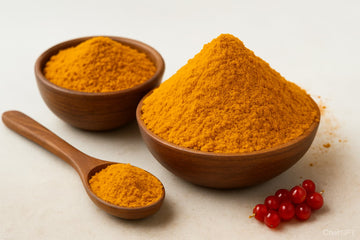Curcumin powder has gained attention among health-conscious individuals for its role in wellness and preventative nutrition. Derived from turmeric root, curcumin is the bright yellow pigment responsible for much of turmeric’s reputation as a functional food. While turmeric as a spice has been used for centuries, concentrated curcumin powder provides a higher dose of its bioactive compounds, offering broader potential in health management.
What is Curcumin Powder?
Curcumin is a polyphenol naturally present in turmeric, with antioxidant and anti-inflammatory properties. The amount of curcumin in turmeric powder is relatively low, averaging between 2 and 5%. To achieve meaningful levels, turmeric undergoes extraction and refinement, resulting in concentrated curcumin powder.
The extraction of curcumin from turmeric powder generally involves solvent or supercritical fluid techniques, ensuring higher purity and enhanced bioavailability. For consumers seeking quality, high curcumin turmeric powder or products marketed as the best turmeric powder with high curcumin content provide more concentrated levels, which can make a significant difference in supplementation.
Curcumin Powder Uses
1. General Wellness
Curcumin is widely used for its antioxidant capacity. By neutralising free radicals, it supports cellular defence, which is critical for long-term health.
2. Joint Support
One of the most recognised curcumin powder uses is addressing joint stiffness and mobility challenges. Its natural anti-inflammatory activity has made it popular among individuals seeking alternatives to conventional joint care solutions.
3. Digestive Balance
In traditional practices, turmeric has long been linked with digestive comfort. Concentrated curcumin powder may extend those benefits by promoting gut health through its influence on the microbiome and intestinal barrier function.
4. Cognitive Support
Emerging studies suggest that curcumin may influence brain health through pathways connected to oxidative stress and inflammation. While research continues, early findings suggest potential in supporting memory and mood.
5. Cancer Research Context
Interest in curcumin powder for cancer has grown, with preclinical studies highlighting its role in disrupting abnormal cell pathways. While not a standalone treatment, curcumin is being investigated as a complementary agent in oncology research.
Curcumin Powder Health Benefits
Anti-Inflammatory: Chronic inflammation is connected to a wide range of health conditions. Curcumin targets specific inflammatory markers, positioning it as an appealing natural option for those who prioritise anti-inflammatory nutrition.
Antioxidant Protection: Curcumin enhances the activity of the body’s natural antioxidant enzymes, amplifying defence against oxidative damage.
Cardiovascular Support: By influencing cholesterol balance, endothelial function, and inflammatory pathways, curcumin contributes to overall cardiovascular wellness.
Metabolic Health: Research suggests curcumin plays a role in blood sugar balance and lipid metabolism. These findings have led to growing interest in curcumin as part of metabolic health regimens.
Immune System Modulation: Curcumin supports immune response by regulating inflammatory cytokines and immune cell signalling.
When comparing to other botanical powders, Lakadong turmeric benefits stand out. This variety of turmeric, grown in Meghalaya, India, naturally contains higher levels of curcumin compared to common turmeric.
Consumers searching for the best turmeric powder with high curcumin content often turn to Lakadong turmeric for its naturally enhanced profile.
Dosage and Technical Details
Determining the right curcumin powder dosage depends on product concentration and health goals. Clinical research frequently examines daily ranges between 500 mg and 2,000 mg of standardised curcumin extract. However, absorption can be limited, which is why formulations often include piperine (black pepper extract) or are designed as water-soluble curcumin powder to improve bioavailability.
When assessing supplements, many health-conscious consumers consider curcumin powder technical details such as purity percentage, source of turmeric, bioavailability enhancement method, and absence of synthetic additives.
Comparison with Other Herbal Powders
Shatavari Powder
Known for its adaptogenic properties, Shatavari powder is often valued for female reproductive health and stress resilience. While not a direct substitute for curcumin, it reflects the broader trend of using concentrated botanicals for functional nutrition.
Jatamansi
The benefits of Jatamansi revolve around calming effects and cognitive support. Like curcumin, it is tied to traditional medicine systems, though it acts through different pathways.
By comparing these powders, health-conscious individuals can better design a balanced approach to supplementation, combining antioxidants like curcumin with adaptogens such as Shatavari and Jatamansi.
Curcumin Powder Price
The curcumin powder price varies based on purity, extraction method, and origin. Standard turmeric powder is less expensive but offers a lower curcumin concentration. On the other hand, products marketed as high-curcumin turmeric powder or standardised extracts command higher prices due to quality control and enhanced bioavailability.
Consumers who value transparency should review labels for details on extraction processes and curcumin content per serving. Investing in high-quality options ensures alignment with personal wellness goals.
Side Effects
While curcumin powder is widely regarded as safe, high doses may cause mild digestive discomfort in some individuals. Reported effects include nausea or diarrhoea when consumed in excess.
Those with gallbladder issues or individuals taking anticoagulant medication should consult healthcare providers before starting supplementation. Pregnant or lactating women are advised to seek professional guidance as well.
Final Thoughts
Curcumin powder represents a concentrated way to access turmeric’s bioactive compounds. Its anti-inflammatory, antioxidant, and immune-supportive roles have made it a cornerstone of modern natural health routines. With options ranging from Lakadong turmeric benefits to advanced water-soluble curcumin powder formulations, consumers have a wide variety of choices to suit their goals.
Pairing curcumin with complementary botanicals like Shatavari powder or exploring the benefits of Jatamansi adds depth to a natural wellness strategy. By considering purity, curcumin powder dosage, and curcumin powder technical details, individuals can make informed decisions aligned with their health priorities.
Also check - Big Cardamom Benefits for Digestion and Heart Health










